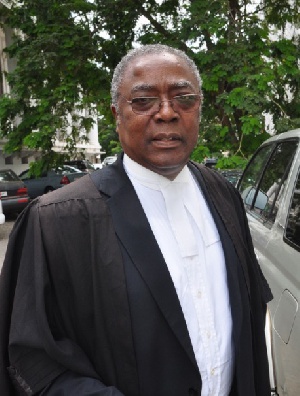General News of Tuesday, 6 August 2013
Source: Musah, Abdul Rahman
EC accuses NPP of cherry-picking evidence
The EC accuse NPP of cherry-picking evidence to support its petition.
“A pink sheet must be read as a whole and when so read, the errors it contains are discernible if one reads the form with the eye of a person desirous of conducting a careful analysis of its content as opposed to the eye of a person looking for errors and blank spaces for possible harvest of votes for annulment,” the Electoral Commission (EC) of Ghana told the Supreme Court of Ghana in it's final address to the court.
The Electoral Commission of Ghana addressed judges of the Supreme Court of Ghana empanelled by Ghana’s Chief Justice, Her Lordship Mrs. Justice Georgina Woods in a just ended election petition hearing held at the Supreme Court building in Accra, Ghana. The petition was brought forward by leadings members of the opposition New Patriotic Party (NPP) disputing the result of the December 2012 presidential election in Ghana as declared by the EC.
The EC also dismissed NPP’s claims of over-voting in the December 2012 election. It argued that the petitioners (Nana Addo Danquah Akufo Addo, Dr. Mahamadu Bawumia and Mr. Jake Opanka Obitsebi Lamptey) have not led a single witness in court to demonstrate over-voting.
“There is ample evidence for your lordship to conclude that the petitioners have not established that there was over as they were not able to cite a single example among the 26,002 polling stations in which votes in the ballot box exceeded the number of persons entitled to vote,” the EC argued.
On the petitioners’ question of voting without biometric verification, the EC said that they were only able to demonstrate that on the face of the “pink of sheets.” It added that petitioners did not provide in court any evidence of a person who saw anyone vote without being biometric verified.
It added that even if some people voted without being biometrically verified the vote cannot be invalidate because the Constitution of Ghana, as well as Supreme Court precedence overrides Regulation 30 (2) of C.I. 75, which prohibits voting without biometric verification. It cited the case of Tehn-Addy vs. Apaloo in which the Supreme of Ghana held that a person qualified under article 42 of the 1992 Constitution of Ghana cannot be denied the right to vote or his entitlement to be registered as a voter.
The EC again denied the petitioners claim that there were duplicated serial numbers on pink sheets. It described the claim as “the weakest link in an already weak chain.”
“Not one person identified a polling station by anything other than its name and unique code,” the EC said.
The EC however admitted there were irregularities in the conduct of the election in some polling stations. It the assigned the reasons for such irregularities as clerical errors on the part of polling officials who in some instances forgot or overlooked to append their signatures on vital polling documents and wrongly filling out documents in the manner not prescribed by the commission’s rules and regulations.
It however added that the clerical errors cannot form the basis for annulling an entire Presidential election. The EC address concluded that the December 2012 presidential election that it declared Ghana’s President John Dramani Mahama, the first respondent in the petition winner, was free and fair.
The EC claim it ensured a very high level of transparency and verifiability regarding the results at polling stations. It said the counting and announcement of results was done in public at polling stations across the country and carried on both airwaves and print media. The EC also said that results were physically delivered to returning officers at collation centres across the country.
“At the collation centres, collation/counting agents were present with their laptops and calculators for the collation and counting of the votes cast in all polling station in a constituency.” The EC said.
In its’ concluding remarks, the Electoral Commission though it lawyer, Mr. James Quashie-Idum, urge the court to dismiss case as without merit. It assured the court and Ghanaians that it will do everything possible to minimize the occurrence of administrative errors at future elections.
The Electoral Commission of Ghana hires over one hundred thousand temporary officials who it trains on a relatively short period of time to conduct parliamentary and presidential elections every fours.
The marathon hearing of the election petition lasted three months. Three witness testified; one for the petitioners and two for the respondents.
The Chairman of the Electoral Commission of Ghana, Dr. Kojo Afri-Gyan, took the stand on behalf of the Electoral Commission. The ruling National Democratic Congress (NDC) Chairman, Mr. Asiedu Nketia, affectionately called General Mosquito, testified for the President and the ruling party. Dr. Mahamadu Bawumia, the vice Presidential Candidate of the opposition NPP testified for the petitioners.
KPMG, an Accra based auditing firm, was entrusted by the court to audit the election returns duplicate receipt (pink sheets) submitted by the petitioners.
His Lordship Mr. Justice William Atubuga, the most senior judge of the Supreme Court of Ghana, chaired the panel of Judges that heard the petition.











